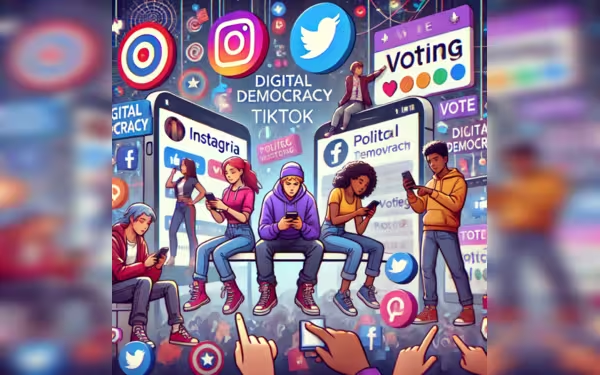Saturday, November 16, 2024 06:43 PM
Social Media's Impact on Youth Political Engagement
- Youth actively participate in political discussions online.
- Social media amplifies marginalized voices and movements.
- Misinformation challenges youth's understanding of politics.
 Image Credits: nation_pk
Image Credits: nation_pkExplore how social media influences political engagement among youth, amplifying voices and challenging misinformation.
In recent years, the influence of social media on political engagement, especially among the youth, has become a hot topic. With platforms like Twitter, Facebook, Instagram, and TikTok, young people are not just passive consumers of information; they are active participants in political discussions and movements. This shift has changed how political information is shared and how young individuals engage with the political landscape.
Social media has opened the floodgates for information, allowing young people to access a wide range of opinions and discussions about political issues. According to studies, over 70% of youth globally rely on social media as their main source of news. This means that political content is not just a side note; it plays a crucial role in how young people understand and interact with the world around them.
One of the most significant impacts of social media is its ability to amplify the voices of those who are often overlooked. Movements like #BlackLivesMatter and #MeToo have gained momentum through these platforms, showing how social media can be a powerful tool for raising awareness about important issues like racial equality and gender rights. Young people are using these platforms to mobilize and advocate for change, proving that social media can be a force for good.
However, it is essential to recognize that social media also has its downsides. The algorithms that determine what content users see can create “echo chambers,” where individuals are only exposed to information that aligns with their existing beliefs. This can deepen political divides and make it challenging for people to engage in meaningful conversations with those who hold different views. Yet, this polarization has also sparked a wave of youth activism, as young people harness social media to organize protests and campaigns for various causes.
Moreover, social media's influence extends to political participation, particularly voting. Research indicates that exposure to political content on these platforms can increase the likelihood of young people voting. Campaigns are now targeting younger demographics with messages that resonate with them, often using influencers to connect directly with young voters. For instance, during the 2020 U.S. presidential election, social media played a crucial role in encouraging youth participation, with many young voters citing social media as a significant influence on their decision to vote.
Despite the advantages, the spread of misinformation on social media poses a serious challenge. Young people are often bombarded with misleading information that can distort their understanding of political issues. To combat this, it is vital to promote digital literacy, helping young individuals learn how to evaluate information critically and identify reliable sources. Governments and organizations are increasingly focusing on media literacy initiatives to ensure that social media remains a productive tool for political engagement.
As social media continues to evolve, its role in shaping political engagement among youth is likely to grow even more significant. The potential for these platforms to engage young people in political processes is immense, offering new ways to participate, advocate, and vote. However, to harness this potential fully, it is crucial to address the challenges of misinformation, political polarization, and the need for digital literacy.
The future of youth political engagement hinges not only on the active use of social media but also on the informed and responsible use of these platforms. By working together, governments, educational institutions, and civil society can empower young people to use social media as a tool for positive political change. This will contribute to a more informed, active, and engaged electorate, ensuring that the voices of the youth are heard loud and clear in the political arena.













